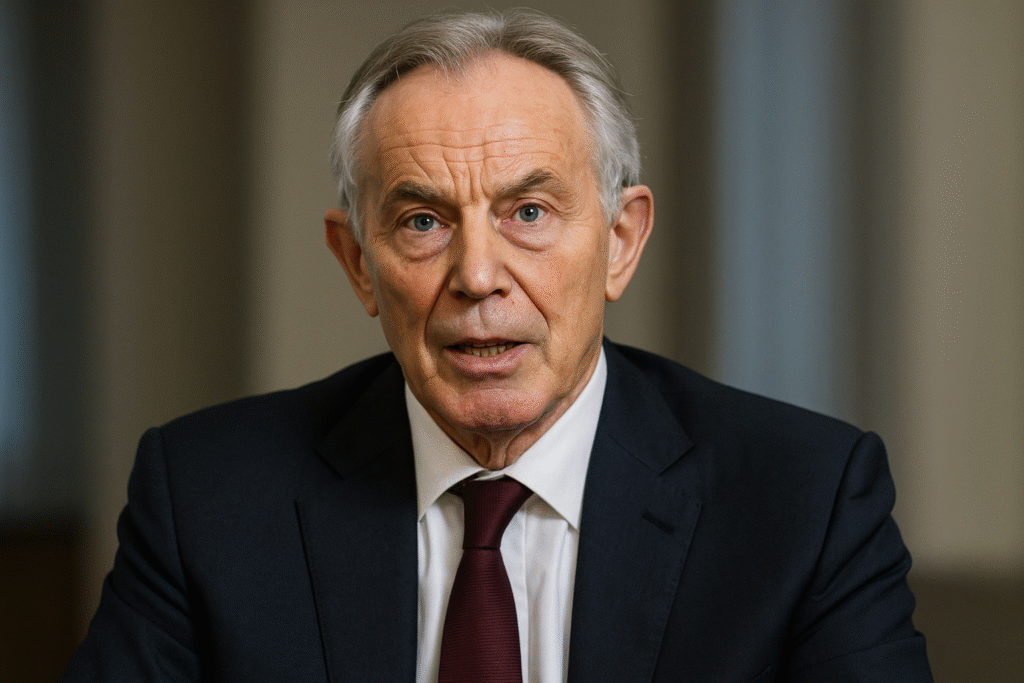By Harshit | September 26, 2025 | London, UK | 1:00 PM BST
Former UK Prime Minister Sir Tony Blair has reportedly been involved in discussions about heading a post-war transitional authority in Gaza, with plans said to have backing from the White House and support from the UN and Gulf nations. The proposed authority would oversee Gaza’s administration temporarily before transferring control back to Palestinians.
Blair’s potential role
According to reports from the BBC, the Economist, and Israeli media, Blair could lead a body named the Gaza International Transitional Authority (Gita). This entity would seek a UN mandate to act as Gaza’s “supreme political and legal authority” for a five-year period. The plan draws inspiration from international administrations that guided East Timor and Kosovo through post-conflict transitions.
The transitional authority would initially operate from Egypt, near Gaza’s southern border, before moving into Gaza once the territory stabilizes. It would also be supported by a multinational force. Blair’s office clarified that he would not support any proposal that involved displacing the people of Gaza.
Past involvement in the Middle East
Blair, who was UK Prime Minister from 1997 to 2007, led Britain into the Iraq War in 2003, a decision widely criticised in the official Chilcot inquiry. After leaving office, he served as Middle East envoy for the Quartet of international powers—the US, EU, Russia, and the UN—focusing on economic development in Palestine and creating conditions for a two-state solution.
In August, Blair joined a White House meeting with former President Trump to discuss Gaza, which US Middle East envoy Steve Witkoff described as “very comprehensive,” although details were limited.
Regional and international context
The proposal comes after Palestinian President Mahmoud Abbas indicated his willingness to work with Trump and other international leaders on a two-state peace plan. Abbas emphasized that Hamas should be disarmed and rejected any future governing role for the group in Gaza.
Earlier proposals have included Trump’s February plan for US “ownership” over Gaza, which suggested the territory could become the “Riviera of the Middle East,” though this plan has since been abandoned. Critics noted it would have violated international law due to forced displacement.
In March, a US- and Israel-backed plan rejected an Arab-led proposal that would allow Gaza’s 2.1 million residents to remain while a committee of independent experts governed temporarily alongside international peacekeepers. A French- and Saudi-led New York conference in July proposed a transitional administrative committee operating under the Palestinian Authority. This so-called New York Declaration was supported by a majority of the UN General Assembly, although the US and Israel did not participate.
UK recognition of Palestine
Earlier this week, the UK formally recognized the State of Palestine, joining France, Canada, Australia, and other nations in affirming a two-state solution with East Jerusalem as the Palestinian capital. Israel and the US criticized the move, calling it a “reward for Hamas.”
Ongoing conflict in Gaza
The discussions around transitional governance come amid the ongoing Israel-Hamas conflict, which began on 7 October 2023 after a Hamas attack on southern Israel that killed roughly 1,200 people and took 251 hostages. Since then, at least 65,502 people have been reported killed in Gaza by Israeli strikes, according to Hamas-run health authorities. A UN commission of inquiry has declared that Israel has committed genocide in Gaza, a claim Israel denies.
Implications
Blair’s potential leadership of a transitional authority underscores the international community’s interest in stabilizing Gaza post-conflict. The plan reflects a balance between external oversight and eventual Palestinian self-governance, while seeking to avoid the displacement of civilians.
As international negotiations continue, the success of such a transitional authority will depend on cooperation among global powers, regional actors, and Palestinian authorities, and whether stability can be established in the densely populated and conflict-affected Gaza Strip.

